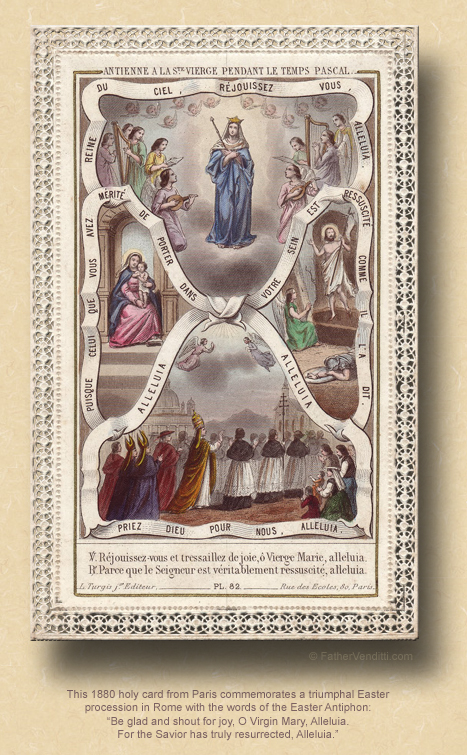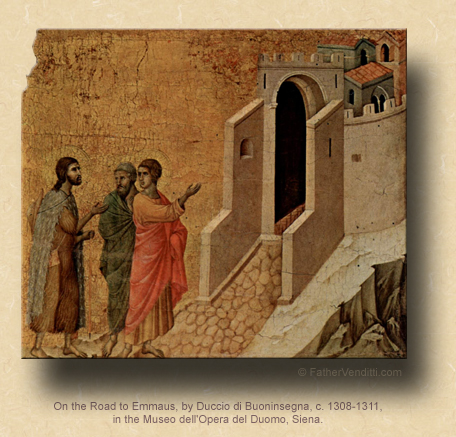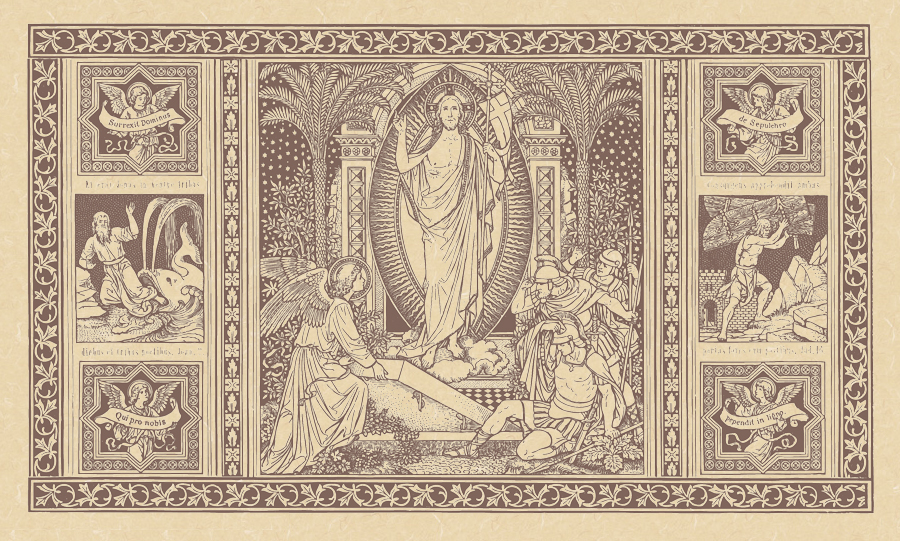In the Whisper of a Gentle Breeze.
Easter Wednesday.
Lessons from the octave, according to the ordinary form of the Roman Rite:
• Acts 3: 1-10.
• Psalm 105: 1-4, 6-9.
• [Sequence (optional)]: Victimæ paschali laudes…*
• Luke 24: 13-35.
Lessons from the octave, according to the extraordinary form of the Roman Rite:
• Acts 3: 13-15, 17-19.
• Pslam 117: 24, 26.
• [Sequence] Victimæ paschali laudes…*
• John 21: 1-14.
Bright Wednesday.
Lessons from the pentecostarion, according to the Ruthenian recension of the Byzantine Rite:
• Acts 2: 22-36.
• John 1: 35-51.
FatherVenditti.com
|
 7:37 AM 4/19/2017 — We haven't had a homily since Easter, giving myself—and you—a bit of a break; but, it's already Easter Wednesday, so we might as well get back to the grindstone and venture forth once again. 7:37 AM 4/19/2017 — We haven't had a homily since Easter, giving myself—and you—a bit of a break; but, it's already Easter Wednesday, so we might as well get back to the grindstone and venture forth once again.
It's always amazed me how popular devotion is sometimes influenced by religious art, especially in cases where the religious art may not be based on the best theology or knowledge of the Sacred Scriptures. A good case in point may be some of the images of the Resurrection of our Lord that you see sometimes on Holy Cards of just a few decades back or earlier, or engravings or prints found in old missals. I remember as a kid being very impressed with a Holy Card of the Resurrection which depicted the stone in front of the tomb broken into a million pieces, and lightening bolts shooting out of the tomb as our Blessed Lord emerged triumphantly, waving a banner with a cross on it like a battle flag, surrounded by angels blowing trumpets, with a couple of Roman centurions on the ground cowering in fear and shielding their eyes from the brightness. In fact, the banner image on my own web site for Easter is an engraving very much like that, which I used because I like the picture; but, I shouldn't have to tell you that the Resurrection wasn't anything like that.
Our Lord's Resurrection from the dead, like everything our Lord did, was done very subtly: there weren't any trumpets, there weren't any lighting bolts, and those who happened to come across our Lord right after his Resurrection didn't recognize Him. When Mary Magdalene found the tomb empty in yesterday's Gospel lesson, and Jesus walked up to her and asked why she was weeping, she thought He was the gardener (John 20: 11-18).
Back in January, on the Feast of the Baptism of the Lord, we talked about the subtlety with which God reveals Himself, both in the Old and New Testaments. Moses, after hearing God's voice from the burning bush, went to look for God, and Exodus says, “The Lord came down to meet him, hidden in cloud” (Exodus 34: 5 Knox). When Elijah was told that God would be passing by, and went out to meet Him, he looked everywhere he thought God might be: he didn't find God in the mountain, he didn't find God in the earthquake, he didn't find God in the fire; he almost missed Him, finding Him where he would never have thought to look: in “the whisper of a gentle breeze” (I Kings 19: 12 Knox). The prophet Job described his own initial contact with God, saying, “Hidden from my sight, hidden from my thought, he comes and goes” (Job 9: 11 Knox).
And how many Gospel lessons have we looked at together this past year in which God, in the person of Christ, is just passing by someone, like the blind man sitting by the side of the road to Jericho (Luke 18: 35-37), or Zacchaeus who only hears that Christ is passing by and has to climb up a tree to try and get a better look (vs. 1-4). No lighting bolts, no blast of trumpets. God doesn't scream at man, He whispers.
Elijah looked for lightening bolts but didn't see them; he listened for trumpets but didn't hear them. It never occurred to him to seek God in the whisper of a gentle breeze. And it doesn't occur to us either, which is why we so often miss our Lord as He works in our lives. We're always looking for God to show us the way; but, chances are, He's already shown us, in something said to us by a friend, or something preached to us in Church, or maybe by nothing more than the simple, straight-forward language of the obligations of our state in life which dictate to us what needs to be done, no matter how mundane it may seem.
Why is God so circumspect? Why is He so subtle? Why isn't He more direct? And I think that today's Gospel lesson gives us the answer. It's an event recorded only by Luke, not found in any of the other Gospels. It happens after our Lord had risen from the dead, but had not yet revealed Himself to His Apostles. Two of his disciples—only one of them is named, and it's a name not heard before or afterward in the Gospel—are walking along the road to a village called Emmaus, and encounter our Lord; but, like everyone else who's seen Him, do not recognize Him in His glorified body.  And, at the end of the journey, the Evangelist tells us: “And now they were drawing near the village to which they were walking, and he made as if to go on further; but they pressed him, 'Stay with us…'” (24: 28-29 Knox). His pretending to continue on is a ruse; it puts the burden of action on them, and forces them to act on their own initiative: if they want Jesus to stay with them, they're going to have to ask. And, at the end of the journey, the Evangelist tells us: “And now they were drawing near the village to which they were walking, and he made as if to go on further; but they pressed him, 'Stay with us…'” (24: 28-29 Knox). His pretending to continue on is a ruse; it puts the burden of action on them, and forces them to act on their own initiative: if they want Jesus to stay with them, they're going to have to ask.
Thankfully, they do just that, and it's during this visit with them that our Lord decides to stay for dinner, and you don't need me to tell you the significance of what happens next: “And then, when he sat down at table with them, he took bread, and blessed, and broke it, and offered it to them; whereupon their eyes were opened, and they recognized him…” (24: 30-31 Knox). He says Mass for them, and gives them Himself in Holy Communion, and that's when they recognize Him.
And what may be even more significant is what happens right after that, because, no sooner do they recognize him the Blessed Sacrament, Saint Luke says, “and with that, he disappeared from their sight” (v. 31 Knox). Why does He disappear? Because the Eucharist is Jesus, and there's no reason for Him to be present in some double form. Once they've been given the Blessed Sacrament, there's no need for His human form to hang around any longer. The Blessed Sacrament is just as much Jesus as He was walking around Emmaus in the flesh. But, like every manifestation of our Lord, in both Testaments, the Blessed Sacrament is subtle: it still looks like bread and wine, it still tastes like bread and wine; put it under a microscope, and you'll see nothing unusual. It's not bread and wine, but that's how the miracle of the Blessed Sacrament works.
Now, all of this we all believe, otherwise we wouldn't be here at Holy Mass. The question is, do we recognize the irony of how often we ignore this in our daily life? All of life is a Eucharistic sacrifice; all of life is a Mass in the sense that God is continually speaking to us—showing Himself to us—in the circumstances of our state in life and our daily duties; but, as in the Blessed Sacrament itself, we don't see anything different or unusual about them. We keep looking for God in lightening bolts and listening for Him in some blast of trumpets. There aren't going to be any fireworks. If, like Elijah, we keep looking for God in the grandeur of nature or in some miracle that defies explanation, what are we looking for other than something that would make faith irrelevant? On Sunday, our Lord will say to Thomas, “Blessed are those who have not seen, yet believe” (John 20: 29).
We all know how to recognize our Lord in the breaking of the bread, in the Blessed Sacrament; let's pray that we also may learn to see Him, as Elijah eventually did, in the whisper of a gentle breeze.

* "Christians! to the Paschal Victim offer your thankful praises. The Lamb the sheep redeemeth: Christ, Who only is sinless, reconcileth sinners to the Father. Death and life contended in that conflict stupendous: the Prince of Life, Who died, deathless reigneth. Speak, Mary, declaring what Thou sawest wayfaring: 'The tomb of Christ Who now liveth: and likewise the glory of the Risen. Bright Angels attesting, the shroud and napkin resting. Yea, Christ my Hope is arisen: to Galilee He goeth before you.' We know that Christ is risen, henceforth ever living: Have mercy, Victor King, pardon giving. Amen. Alleluia."
|

